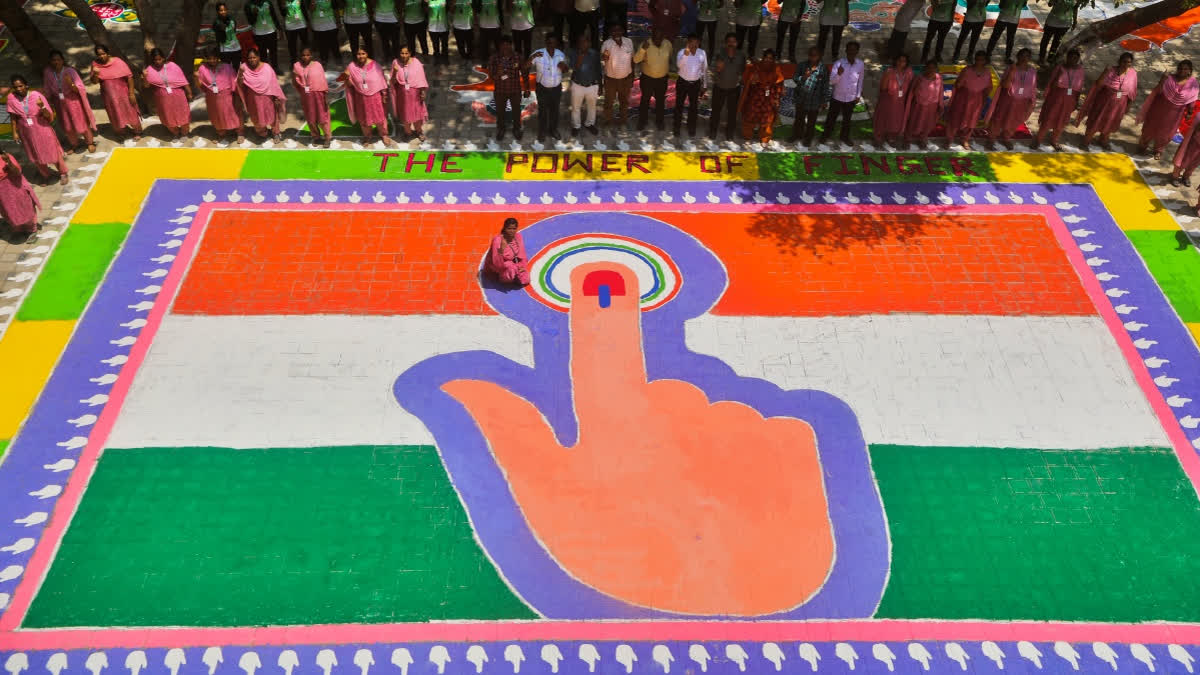Hyderabad: The world's biggest electoral exercise is barely two days away as India, the most populated country in the world, is all set to vote in the first phase of the 2024 Lok Sabha Election on April 19.
The polls will elect the 18th Lok Sabha as millions across 28 states and 8 Union territories will vote in seven phases. The counting of votes will take place on June 4.
As many as 102 seats across 21 states and union territories will vote in the first phase of the general elections that will be conducted across seven phases -- Phase 1 on April 19, followed by subsequent phases on April 26, May 7, May 13, May 20, May 25, and June 1. The votes will be counted on June 4.
Facts at a Glance
Campaigning Ends, Silence Period Begins
The poll campaigning for the first phase of Lok Sabha elections concluded at 3 pm on Wednesday in the North East, at 6 pm in other areas, the Election Commission of India said.
The silence period refers to a period of 48 hours before the conclusion of election, during which any form of campaigning is prohibited. This includes public meetings, speeches, interviews, and displaying or propagating election-related material through print, electronic media, or social media.
The purpose of this silence period is to allow voters a calm and peaceful environment for reflection before they cast their votes, without being influenced by last-minute campaigning. The silence period begins from 48 hours before the scheduled close of the polls. For phase 1, the silence period began at 5 pm on Wednesday, Apr 17.
Here are the key points to know about silence period
- It lasts for 48 hours before the conclusion of the election in a particular constituency.
- During the silence period, all forms of election campaigning are banned. This includes rallies, speeches, public meetings, and canvassing.
- Media outlets are also prohibited from airing election-related content such as advertisements, interviews, or debates during the silence period.
- The ban on campaigning extends to social media platforms. Political parties and candidates are not allowed to post new content related to the election during this period.
- Distribution of pamphlets, posters, or any printed material related to the election is not permitted during the silence period.
- The purpose of the silence period is to provide voters with a calm and peaceful environment for making their decisions without last-minute influences.
- The Election Commission of India may grant exemptions for specific announcements related to the election process or changes in polling arrangements during this period.
- Strict enforcement measures are in place to ensure compliance with the silence period regulations. Violators can face legal consequences.
- The silence period is crucial for ensuring a fair and level playing field among candidates, preventing last-minute attempts to sway voters.
- The Election Commission encourages voter awareness initiatives before the silence period begins to ensure voters are well-informed before entering this phase of quiet contemplation.
Constituencies going to polls in phase 1
- Andaman and Nicobar Islands – Andaman and Nicobar Islands
- Arunachal Pradesh – Arunachal Pradesh East, Arunachal Pradesh West
- Assam – Dibrugarh, Jorhat, Kaziranga, Lakhimpur, Sonitpur
- Bihar – Aurangabad, Gaya, Jamui, Nawada
- Jammu and Kashmir – Udhampur
- Chhattisgarh – Bastar
- Lakshadweep – Lakshadweep
- Madhya Pradesh – Chhindwara, Balaghat, Jabalpur, Mandla, Sidhi, Shahdol
- Maharashtra – Chandrapur, Bhandara – Gondiya, Gadchiroli – Chimur, Ramtek, Nagpur
- Manipur – Inner Manipur, Outer Manipur
- Rajasthan – Ganganagar, Bikaner, Churu, Jhunjhunu, Sikar, Jaipur Rural, Jaipur, Alwar, Bharatpur, Karauli-Dholpur, Dausa, Nagaur
- Meghalaya – Shillong, Tura
- Mizoram – Mizoram
- Nagaland – Nagaland
- Puducherry – Puducherry
- Sikkim – Sikkim
- Tamil Nadu – Tiruvallur, Chennai North, Chennai South, Chennai Central, Sriperumbudur, Kancheepuram, Arakkonam, Vellore, Krishnagiri, Dharmapuri, Tiruvannamalai, Arani, Viluppuram, Kallakurichi, Salem, Namakkal, Erode, Tiruppur, Nilgiris, Coimbatore, Pollachi, Dindigul, Karur, Tiruchirappalli, Perambalur, Cuddalore, Chidambaram, Mayiladuthurai, Nagapattinam, Thanjavur, Sivaganga, Madurai, Theni, Virudhunagar, Ramanathapuram, Thoothukkudi, Tenkasi, Tirunelveli, Kanniyakumari
- Tripura – Tripura West
- Uttarakhand – Tehri Garhwal, Garhwal, Almora, Nainital- Udhamsingh Nagar, Haridwar
- West Bengal – Coochbehar, Alipurduars, Jalpaiguri
- Uttar Pradesh – Saharanpur, Kairana, Muzaffarnagar, Bijnor, Nagina, Moradabad, Rampur, Pilibhit
Key Constituencies in Phase 1
Among the key constituencies in the first phase of the Lok Sabha elections are Dibrugarh and Sonitpur in Assam, Nagpur in Maharashtra, Jamui in Bihar, Bastar in Chhattisgarh, Udhampur in Jammu & Kashmir, Chhindwara in Madhya Pradesh, Inner Manipur and Outer Manipur, Puducherry, Bikaner in Rajasthan, Chennai North, Chennai South, Chennai Central, and Coimbatore in Tamil Nadu, Muzzafarnagar and Pilibhit in Uttar Pradesh, and Coochbehar and Alipurduars in West Bengal.
Key Candidates in Phase 1
The key candidates in the fray for phase-1 of the Lok Sabha elections 2024 are Jitendra Singh (Udhampur), Nitin Gadkari (Nagpur) Chirag Paswan (Jamui), Nakul Nath (Chhindwara), K Annamalai (Coimbatore), L Murugan (Nilgiris), Tamilisai Soundararajan (Chennai South), Pon Radhakrishnan (Kanniyakumari), Kanimozhi Karunanidhi (Thoothukkudi), V Vaithilingam (Puducherry), Harendra Singh Malik (Muzaffarnagar), Sivaganga (Karti Chidambaram) Sanjeev Balyan (Muzaffarnagar), Jitin Prasada (Pilibhit), Manoj Tigga (Alipurduars), and Nisith Pramanik (Coochbehar).
Read More
- Explained: How EVMs Are Allotted For Polls? All You Need To Know
- Lok Sabha Election 2024 Phase 1: List of States, Constituencies Observing Dry Days from Apr 17
- Lok Sabha Election 2024: What Happens If EVM Malfunctions During Voting Or Voter Presses A Wrong Button?
- 2024 Lok Sabha Polls: How To Vote Without Voter ID Card
- Lok Sabha Election 2024: Who Is A Service Voter? How Is It Different From Ordinary Voting? Know All
- Lok Sabha Election 2024: What Is E-EPIC, Who Are Eligible And How To Download It?
- Lok Sabha Elections 2024: Here's A Manual For First-Time Voters For Registration
- Lok Sabha Election 2024 Phase 1: List Of States, Constituencies Observing Dry Days From Apr 17


